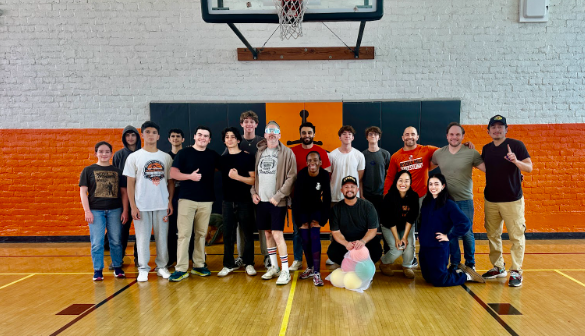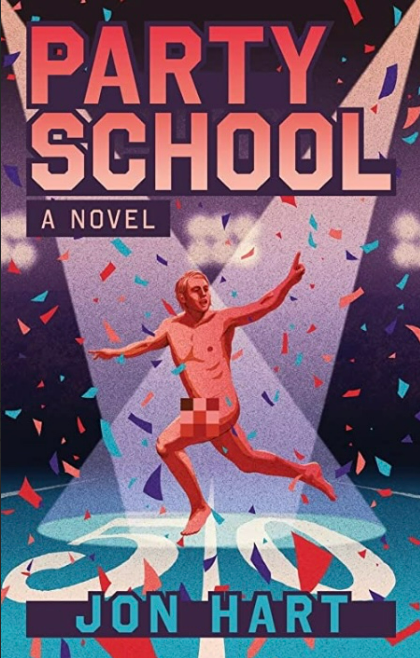Robert Katz, Staff Writer
On Friday night, March 30, the Performing Arts Department’s Grease opened with a bang, but not one that the gathered audience was hoping for. As the “Rydell Alma Mater” began in preppy confidence, all was in order. Yet, perhaps the rebellious spirit of the 1950’s-greaser Burger Palace Boys and Pink Ladies, as the play transitioned to them, infected the stage’s audio equipment, booming over voices and fizzling in the background. Quickly, however, the unintentional speaker storms subsided and the night’s audience was left with a musical with a light spirit, a sizeable dose of goofiness and a surprising amount of suaveness.
Audio errors aside (which can’t always be prevented and, brief as they were, should rarely be factored into the quality of the show), Grease’s musical numbers were, mostly, well-handled. Even without having previously seen them performed, it became apparent that many of the songs were suitably treated with the right amount of slightly-immature teenage romance, such as “Summer Nights” and “Freddy, My Love.” However, the real stand-out acts, aside from the hectic and purely fun “Born to Hand Jive,” tended to be those that only focused on a single actor or actress. “Grease Lightnin’,” which may have been the peak of the show, was an excellent case of the singer, sophomore Roman Zaragoza playing the rough-and-tumble Kenickie, taking complete command of the stage and audience. While much of the number’s choreography was oh-so-slightly off as the surrounding Boys did their hand sweeps and points, all was forgiven during the quite well-synchronized acrobatics and rolls. “There Are Worse Things I Could Do” similarly channels a powerful sense of anarchistic pride through junior Savannah Forno’s portrayal of the sarcastic Rizzo. “Beauty School Dropout,” the other contender for best performance, seemed spot-on, with senior Steve Kearns snazzily personifying a guardian angel, shrouded in bursts of pink smoke and surrounded by his own troupe of angel girls. Another special mention goes to junior Brendan Taglianetti’s portrayal of Doody and “Those Magic Changes,” where he puts his madrigal skills to wonderful use.
The show had its fair share of weaker acts, such as “Mooning,” which at times came off as simply awkward despite a definite charm, and “Rock ‘N’ Roll Party Queen,” which sounded amateurish without being humorous and, as a result, felt like unmemorable filler. What was rather shocking was the lack of musical chemistry between sophomore Anthony Lofaso’s Danny and junior Lina Hebert’s Sandy, the two lead lovers of the play. While the two are quite talented both as actors and as vocalists, they never seem to get along in duets. In “Summer Nights,” and “You’re the One That I Want”, Lofaso appears somewhat unconfident and rarely matches Hebert’s impressive volume, something she maintains in all of her following performances. However, Lofaso fluently and solos in “Alone at a Drive-In Movie” and reveals a very soulful, affected side to his voice. Lofaso and Hebert’s voices don’t mix with much familarity; it sounds as though they haven’t gotten used to each other as much as they should have, given their characters’ relationships.
Many of the individual performances deserve props. Lofaso, while pulling off the “tough guy” act well enough, easily shows a light-hearted side when it becomes natural. Zaragoza is stellar as Kenickie, embodying the spirit Grease better than most of the other Burger Palace Boys and never abandoning the basic idea of having fun. Forno, as previously mentioned, impressively renders Rizzo, never overplaying her role and becoming melodramatic, even in the face of crisis. Junior Eli Lloyd and senior George Efremidze both hilariously play the smooth and not-so-smooth ladies’ men Sonny and Vince Fontaine, respectively. Senior Jennifer Woods, in most of her appearances, steals the audience’s attention as the loud and sometimes obnoxious cheerleader Patty.
The cast’s main difficulty often appeared to be with handling the musical’s nature as a parody of 1950’s urban culture. Often, characters either spoke with too much reservation and came off as somewhat flat, or with overt corniness and appeared to be overacting. While most individual actors managed to straddle the line successfully, the banter occurring among groups often lost its rambunctiousness and instead became a collection of teenagers yelling at each other about girls/boys/the Mouseketeers. Perhaps this was a sign of an audio system that could not conveniently pick up more easily and reasonably-spoken conversations. Regardless, these errors failed to ruin the real core of the show’s script, and much of it still remained hilarious and heartfelt.
The script functioned as a supplement to, not the center of, the play’s wit and charm, the vast majority of which remained in the musical numbers, which usually were rich with personality and sung with fluid grace, aside from some that simply felt a bit too rigid. It’s a show that was polished brightly, but there were a few spots that were probably left a bit rough in favor of the rest.
Categories:
Grease is a silly, stylish time
April 1, 2012
0
Donate to Highlights
$125
$1000
Contributed
Our Goal
Your donation will support the student journalists of Beverly Hills High School. Your contribution will allow us to purchase equipment and cover our annual website hosting costs.
More to Discover






























